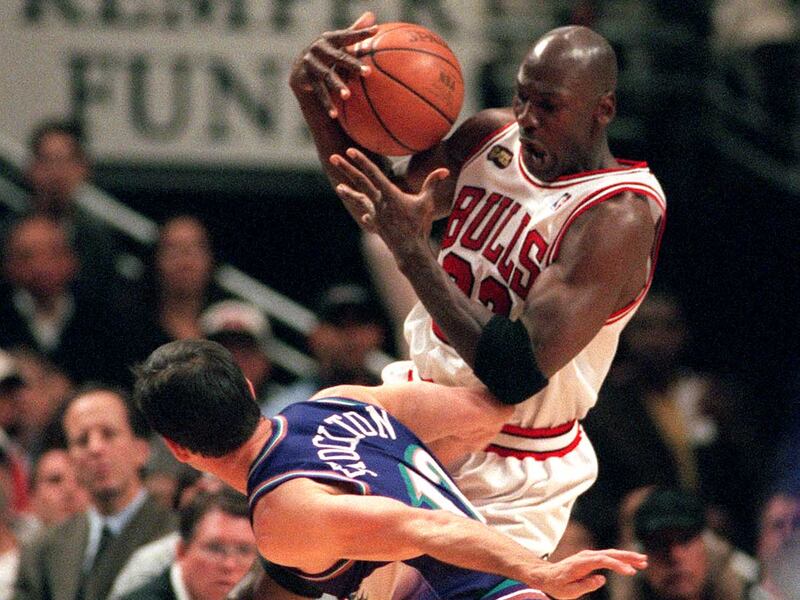“The Last Dance” is the hottest thing going in sports while we wait out the coronavirus and the attendant political gamesmanship.
On the other hand, when ESPN is covering the International Cherry Pit Spitting Championships and replays of old NFL drafts, there’s not a lot of competition for viewers.
But “The Last Dance” — the Michael Jordan documentary — is compelling stuff in itself and it’s educating a new generation of fans about Jordan’s artistry on the court and refreshing the memories of the older fans.
The documentary has given Jordan a platform to re-stake his claim in the ongoing (and often silly) argument for the title of Greatest Of All Time without having to say a word, not that he would anyway. Jordan has refused to be drawn into the GOAT talk; he has wisely stayed above the fray, adding to his mystery and legend. With the release of the documentary, he can let his play do the talking, unlike LeBron James, who talks about it incessantly and even had the temerity to crown himself GOAT and dub himself the “King.”
Jordan has the stage all to himself now that James is grounded by the quarantine (right or wrong, the GOAT debate has focused on only Jordan and James). Their roles have been reversed. The younger player is forced to sit on the sideline while the older player takes the floor, or in this case, the TV screen. James has had the stage to himself for 17 years during which Jordan’s playing days have receded from memory to some degree and become entirely lost to a new generation.
Better sit down for this one. It’s been 17 years since Jordan retired and 22 years since he was relevant (at the end of the second of three “retirements”). Pretty much anyone under the age of about 27 never saw him play or has no memory of it.
In any attempt to rank athletes from different generations, there is an obvious tendency to favor contemporary players. We all know this. To be fair, players must be evaluated relative to their generation. Today’s game is much different than it was even 20 years ago, with new rules, new styles of play, new training regimens. So it’s useful to have the Jordan documentary released at this time, while sports is in timeout, all of which is no accident. Jordan finally signed off on its release after holding out for more than two decades. He always did have a flair for timing.
After watching “Dance,” does anyone still doubt that Jordan is the greatest ever. He played in six NBA championships and won them all. He would’ve won more if he had not retired from basketball after the first of three consecutive championships to pursue a professional baseball career. That cost him almost two full seasons.
He then reeled off three more consecutive championships before the Bulls disbanded. It was like the Beatles breaking up at the top of their game, amid much infighting, with Jerry Krause playing the role of Yoko Ono. They could have added one or two more championships there, too.
It was all driven by Jordan and his iron will, his immense physical gifts, his relentless work ethic and the commanding aura he cast on teammates and rivals. He played in 1,072 games over 14-plus seasons, compared to James’ 17 seasons and 1,258 games. He averaged 30.1 points per game — highest in NBA history; James 27.1. Jordan had a career shooting percentage from the off-guard position of 51%.
Coaches, players and reporters have stated that Jordan would score 40 to 45 (even 50) points per game in today’s NBA, due to the increased pace of play and the resulting increased number of shots, the way fouls are called (no hand checking, for one thing), and the increased emphasis on 3-point shooting (Jordan scored 50 or more points 20 times without taking a 3-point shot).
Jordan won a record 10 scoring titles and six NBA Finals MVP awards, 10 All-NBA first-team selections, nine All-Defensive first-team selections, five MVP awards,
He was unbeaten in six NBA Finals, James is 3-5. Jordan did it the old-fashioned way, playing for the same club for 13 years, laboring seven years with the Bulls before he got his first title; James moved from team to team to surround himself with all-stars to win his titles.
It should be noted that Jordan also won an NCAA championship at North Carolina, hitting the game-winning shot in the finals against Georgetown. Sixteen years later he did the same thing to the Utah Jazz to win his sixth NBA title. He also won two Olympic gold medals, once as a collegian, once as a pro. He played in 35 NBA Finals games and led his team in scoring in 32 of them while still averaging six assists.
But numbers don’t really capture the Jordan Effect. You can’t quantify the way he willed his way to championships through sheer force of his personality. It was worth more than his stunning 46-inch vertical leap or his 4.3 speed. He simply would not allow losing.
If you’ve watched any of the 10-part “Dance” documentary, you’ve probably already made up your mind about the GOAT debate — with good reason.


